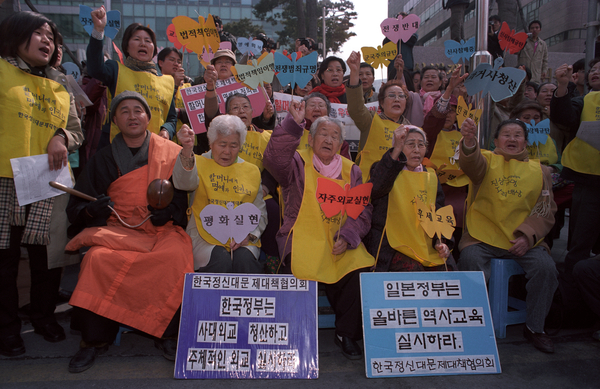
Women from the house of sharing at the ‘Wednesday Demo’ outside Japanese Embassy, Seoul (Photo Credit: Amnesty International).
By Alice Dahle, Amnesty USA’s Women’s Human Rights Coordination Group
Before and during World War II, as the Japanese Imperial Army occupied countries throughout the Asia Pacific region, they deceived, abducted or otherwise forced an estimated 200,000 women and girls, some as young as 12 years old, into a system of sexual slavery.
They especially targeted those who were susceptible because of their age, poverty, class, low family status, lack of education, nationality or ethnicity. These young women, referred to as “comfort women” were subjected to abuse and rape for months, even years. Many died as a result. Those who survived to the end of the war were either killed or abandoned far from their homes with no way to return to their families.
They deceived, abducted or otherwise forced an estimated 200,000 women and girls, some as young as 12 years old, into a system of sexual slavery.
These brave survivors are demanding justice. Since the early 1990s, Korean survivors have organized a feminist movement demanding resolution of the wartime sexual slavery issue. They have been speaking out about Japan’s war crimes and calling for justice and reparations.
In 1993, then Japanese chief cabinet secretary Yohei Kono issued a statement acknowledging for the first time that the Japanese military had recruited women and coerced them to serve as sexual slaves. Since then, however, Japanese government officials have continued to deny or make excuses for the sexual slavery system its military operated during the war.
When the current Prime Minister, Shinzo Abe, took office, he advocated revoking or revising the “Kono Statement,” saying there was insufficient evidence that the “comfort women” had been coerced into prostitution.
But on March 24, 2014, just days before he was scheduled to meet in the Hague with President Barack Obama, and South Korean President Park Geun-hye, his chief cabinet secretary Yoshihide Suga announced that Japan will allow the “Kono Statement” to stand without revision. While the un-revised 1993 Kono Statement is a start, it’s time Japan took full, unequivocal responsibility for its war crimes and for reparations to victims.
The Korean Council for the Women Drafted for Military Sexual Slavery by Japan has launched a 100 Million Signatures Campaign demanding that the Japanese government unequivocally acknowledge its military’s war crimes against them, issue an official apology and provide legal reparations to the survivors or their immediate families.
Amnesty International has called for justice for the survivors and is supporting their campaign. You can show your solidarity by signing their petition online or by printing a copy and collecting more signatures toward their 100 million signature goal!